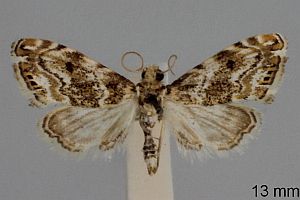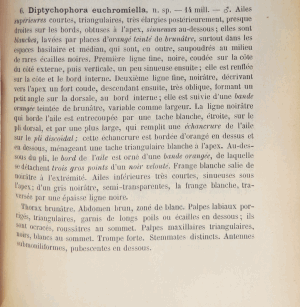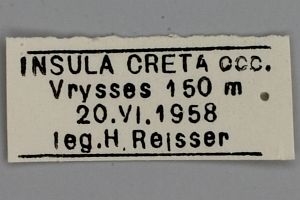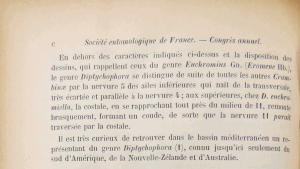Inhalt
2. Diagnose
2.1. Männchen
1-2: ♂, Griechenland, Kreta, Daten siehe Etikett (fot.: Michel Kettner), coll. ZSM, "Klimesch-Sammlung"
2.2. Erstbeschreibung
1-2: Ragonot (1895: XCIX-C) [nach Zeitschriftenexemplar in der Bibliothek des Staatlichen Museums für Naturkunde Karlsruhe]
4. Weitere Informationen
4.1. Andere Kombinationen
- Diptychophora euchromiella Ragonot, 1895 [Originalkombination]
- Pareromene euchromiella Ragonot, 1895 [so bei Błeszyński (1965)]
4.2. Synonyme
- Diptychophora sinualis Hampson, 1900 [synonymisiert von Błeszyński (1965: 53)]
- Pareromene rebeli Osthelder, 1942 [synonymisiert von Błeszyński (1965: 53)]
4.3. Faunistik
Die Art wurde aus Akbès in Syrien beschrieben, kommt aber auch in Armenien, im Taurus und Antitaurus vor. In Europa wurde sie nur auf Kreta nachgewiesen, wo sie auf der Basis eines Weibchens vom Ida-Gebirge in 1300 m Höhe zunächst als eigenes Taxon Pareromene rebeli Osthelder, 1942 galt (Slamka 2008).
(Autor: Erwin Rennwald)
4.4. Literatur
- Błeszyński, S. (1965): Crambinae. — Microlepidoptera Palaearctica 1: Textband I-XLVII, 1-553; Tafelband pl. 1-133. Wien (Verlag Georg Fromme & Co).
- Erstbeschreibung: Ragonot, E.-L. (1895): Microlépidoptères de la Haute-Syrie récoltés par M. Ch. Delagrange et descriptions des espèces nouvelles. — Bulletin des séances et bulletin bibliographique de la Société entomologique de France 1895: XCIV–CIX. Paris. — Digitalisat der Bibliothèque nationale de France: [XCIX].
- Slamka, F. (2008): Pyraloidea of Europe, Vol. 2. Crambinae & Schoenobiinae. Identification - Distribution - Habitat - Biology. — 193 Arten, 223 S., 51 Taf. mit Genitalabb., 24 Farbtaf. – Bratislava (Eigenverlag František Slamka).




![Vorkommen auf Kreta [Slamka (2008)]](/res/img/flag/gr.gif)
![Vorkommen im asiatischen Teil der Türkei [Koçak & Kemal (2018); Slamka (2008)]](/res/img/flag/tr.gif)
![Vorkommen in Armenien [Slamka (2008)]](/res/img/flag/am.gif)
![Vorkommen in Syrien [Slamka (2008)]](/res/img/flag/sy.gif)
![Vorkommen in Iran [Slamka (2008)]](/res/img/flag/ir.gif)





